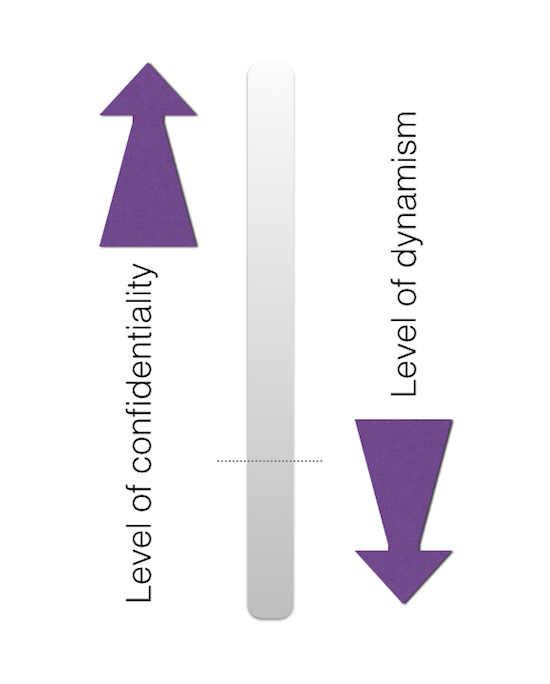In business, we often have to navigate between opposing forces. Take the need for confidentiality versus the spirit of innovation. There are some things that must be kept under wraps. For example, it might be a secret recipe, a pending new product launch or a potential acquisition. Some internal announcements — such as new hirings or postings — need to be kept hush-hush because of the potential impact on others (outgoing person, new boss…). So, it makes sense that communications are managed and confidentiality is respected. The strategic question is: how much corporate information must be kept confidential? Where should the line be drawn? {Tweet this!}
The need for confidentiality

Recognizing the need for confidentiality, the challenge is to define the boundaries. The issue is that, when secrecy becomes pervasive, the fear of taking a wrong step or letting the cat out of the bag too soon can stifle creativity. Some companies — especially in industries where product innovation is capital — tend to live shrouded in secrecy. The default position becomes “CONFIDENTIAL.” The more cautious approach is the safer one. However, that type of mindset is less compatible with openness, curiosity and serendipity.
The spirit of innovation
There are few more important drivers of the business than innovation. As my friend, Thierry Wellhoff, wrote in “Values*,” innovation is a perennial favorite in enterprises around the world. In the 2009 survey, innovation was the #2 value (just behind quality) for all international companies. In France, it is the #1 most cited value for French companies. The importance and interpretation of innovation varies according to sector, but globally, one understands that innovation equates to investment in research and product novelty and/or superiority. Innovation means a reason to pick up the phone and open the order book. It can mean an opportunity to create a buzz and/or get in the press. Innovation is the core processor of progress. {Tweet this!}
Innovation = change
Embedded in the value of innovation are the notions of change and creativity. In some industries, new product is intrinsic to the business, such as fashion and even the agribusiness (where they like to create new gourmet recipes). For the more engineering-oriented industries, the spirit of innovation involves varying degrees of research, testing and applied sciences. There is also the battle of innovation that takes place via the court of law and the trump of patents. The challenge is sustaining a culture of innovation all the while keeping the secret sauces under wraps. There is an inherent tension between being creative and closed off and this is all the more evident in today’s hyper-connected world.
Blue skies innovation

In a world where information is easily accessible, if not overly commoditized, the ability to keep information secret is severely challenged. Moreover, new methods, tools and platforms exist that can now speed up the innovation cycle and expand its scope. Whether the case of the Goldcorp crowdsourced competition, MyStarbucksIdea or innovative crowd-based platforms (e.g. Eyeka), there are innumerable options that test the bounds of confidentiality.

The more the screws of confidentiality are tightened, my belief is that there is a corresponding strangling on the level of dynamism of a brand. I posit that, above the minimal necessary threshold of secrecy, there is an inverse relationship between level of confidentiality and level of creativity and innovation. {Tweet this!} Having a spirit of innovation means having an environment that fosters creativity, encourages interaction and blue sky debate, allows for ongoing testing, failing & learning, incites curiosity and exploration. A secretive mindset tends to have the opposite effect. If your innovation comes from one genius (aka Steve Jobs), that might work. But, long-term, being overly protective about all your data and information will have a negative impact on your spirit of innovation.
Your thoughts?
————
*Wellhoff, Thierry. Values, Creating sense, Guiding communication, Constructing a reputation. Paris, 2009, Editions Wellcom, pp 101-107.











I would add that more and more, innovation will be fueled by data. data ->inisght->innovation with people in the driver seat to decipher all that.